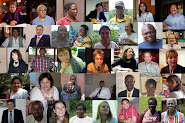The United Nations Environment Program (UNEP) gathered about 40 university students from all over the world in Nairobi, Kenya, from 20th to 26th, April ’09, for discussions and learning on Climate Change: Role of the Sustainability Generation. The overall objective of the workshop was to provide a forum for college students from different regions of the world to engage creatively and innovatively on current environment and sustainability challenges. The workshop program included a session on Student Leadership Development in Universities around Climate Change Issues.
 We had two objectives as we started preparing for this event. We wanted to share how we had approached leadership development for a big group of students at Egerton University, with this group of international students attending the UNEP workshop. At the same time we wanted to give them a personal taste of how experiential learning can take place using very simple tools and techniques. From working with Egerton University students on leadership development we observed that leadership training can help students improve their self-awareness and self-esteem; we also observed positive changes in career ambitions and increased confidence in their ability to succeed in life.
We had two objectives as we started preparing for this event. We wanted to share how we had approached leadership development for a big group of students at Egerton University, with this group of international students attending the UNEP workshop. At the same time we wanted to give them a personal taste of how experiential learning can take place using very simple tools and techniques. From working with Egerton University students on leadership development we observed that leadership training can help students improve their self-awareness and self-esteem; we also observed positive changes in career ambitions and increased confidence in their ability to succeed in life.As universities are breeding grounds for leaders, we started the UNEP session by a discussion of what leadership is and of the importance of student leadership development in Universities. A participatory question on the role of leadership in addressing climate change issues led into an interesting discussion among the students on how students can inspire, challenge, enable, encourage and be role-models for others in creating an environmentally sensitive society. We learnt that leadership development in universities can be instrumental in helping students unlearn stereotypes, negative attitudes and beliefs that may currently be inhibiting the expression of leadership and leadership ambitions among students. The visual explorer exercise helped guide the discussion on effective leadership in tackling climate change. This rolled into a very lively and entertaining session on mental models. Almost everybody in the workshop had insights and experiences with mental models that they wanted to share. The multicultural background of the participants made the discussion even more fun and interesting to listen to as it unfolded.
It seems, from what we are experiencing here in Kenya, that leadership development in Africa, and possibly elsewhere too, is not so much about lecturing leadership principles, but rather about unlearning mental models through dialogue and learningful conversations. By talking and freely exchanging views, new insights based on one’s own realizations can be reached. A deeper understanding of the concepts is then allowed to emerge from within and learning takes place spontaneously.
 Many participants enquired about the availability of the visual explorer tool. We also received requests from Kenyan student participants to set up leadership training at their local campuses. We realize leadership is important to everyone irrespective of their backgrounds; the challenges that the world is facing can and will be addressed through leadership. Leadership development is very relevant and it’s all about contextualizing it in the different areas. We felt encouraged for having contextualized leadership and made it relevant in addressing climate change issues.
Many participants enquired about the availability of the visual explorer tool. We also received requests from Kenyan student participants to set up leadership training at their local campuses. We realize leadership is important to everyone irrespective of their backgrounds; the challenges that the world is facing can and will be addressed through leadership. Leadership development is very relevant and it’s all about contextualizing it in the different areas. We felt encouraged for having contextualized leadership and made it relevant in addressing climate change issues.






















